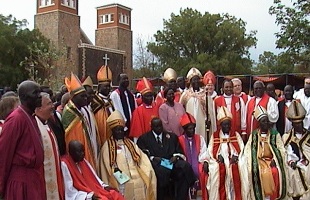S. Sudan church leaders decry lack of inclusion in peace talks
February 2, 2014 (JUBA) – Church leaders in South Sudan have expressed concerns over failure by regional leaders to include them in peace talks aimed at ending weeks of violence in the new nation.

“We are critical of the exclusion of the churches and other civic forces from the peace talks in Addis Ababa, not for the first time; they were excluded from the IGAD [Inter-Governmental Authority on Development] talks which led to the CPA [Comprehensive Peace Agreement] in 2005, despite the leading role the Churches had played in advocacy and working for peace,” partly reads their joint statement.
“Why are church and civic leaders now excluded from the ongoing IGAD talks? Why is it that only those who took up arms are discussing the future of our country? What is the legitimacy of any agreement signed in Addis Ababa built on military groups determining our future?” it adds.
In recent years, however, the church has been instrumental in South Sudan’s peace and reconciliation efforts, with its tops leaders currently leading the Committee for National Healing, Peace and Reconciliation.
A ceasefire deal, for instance, was last week struck between South Sudan government and David Yauyau rebels from Jonglei state, with the church actively involved in the peace process.
The leader also questioned why the negotiations on the country’s future were entrusted in to the hands of political leaders who instigated a crisis in which their followers devastated the country.
“The message of peace is not about a negotiated settlement, but rather the conviction that the unity brought by the spirit can harmonise every diversity,” they said.
CALLS FOR REFORMS
Meanwhile, the various Church heads called “urgent” reforms among the country’s organised forces, especially the national army and police, is urgent.
“Our army has grown in size since the signing of the CPA and has become a significant cost to our nation, at the expense of investment in development priorities. It lacks cohesion. We are conscious of the need to address reconciliation within the armed forces themselves. There is no longer any place for personal militias,” their statement further reads.
“We believe our armed forces need urgent support and pastoral care. We also feel that our national army needs a new name, not associated with a single political party. A professional army should never be involved in politics,” it added.
Decrying the manner in which the youth were manipulated into the army, the church leaders called upon all armed groups, whether government or opposition, whether formal or informal, to respect international norms for armed conflict. Such aspects, they argued, should include respect for and protection of civilians, dignified treatment of prisoners of war, and refraining from extra-judicial killings.
“We insist on respect for institutions such as hospitals, churches and places where displaced civilians shelter,” they jointly advocated.
The violence, which broke out in the capital, Juba in mid-December last year led to 10,000 deaths, according to the International Crisis Group. Also, the United Nations estimates that 740,000 people have since been displaced.
(ST)
